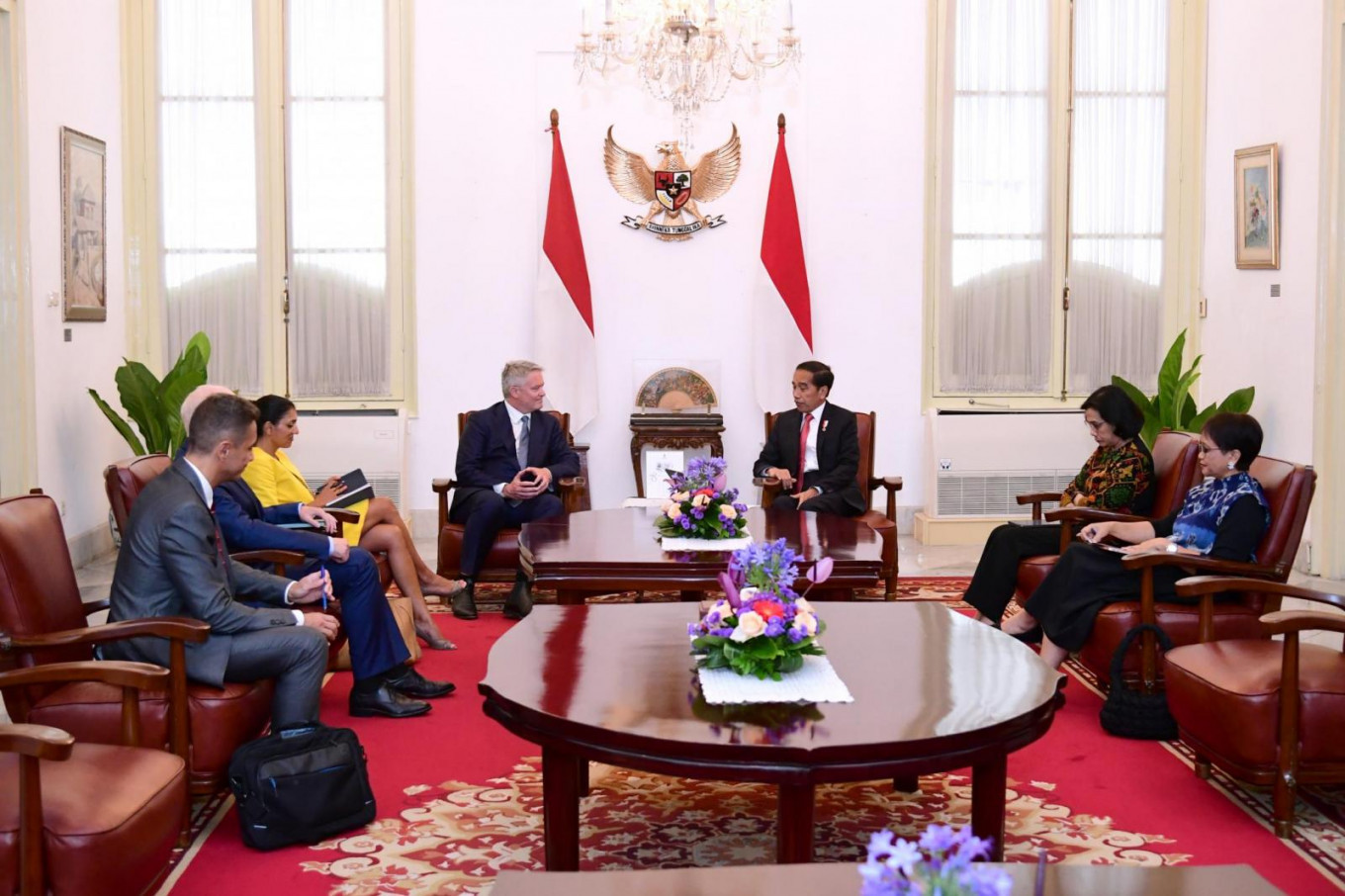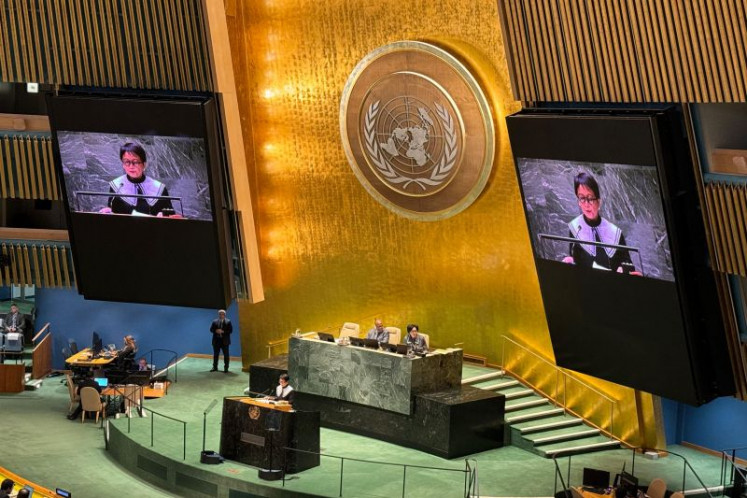Analysis: Indonesia denies normalization with Israel to enter OECD
Change Size
 President Joko “Jokowi“ Widodo welcomes on Aug. 10 a delegation from the Organisation for Economic Co-operation and Development (OECD) with Finance Minister Sri Mulyani Indrawati and Foreign Minister Retno LP Marsudi at the Presidential Palace. (Presidential Secretariat Press Bureau/Lukas)
President Joko “Jokowi“ Widodo welcomes on Aug. 10 a delegation from the Organisation for Economic Co-operation and Development (OECD) with Finance Minister Sri Mulyani Indrawati and Foreign Minister Retno LP Marsudi at the Presidential Palace. (Presidential Secretariat Press Bureau/Lukas)
T
he Indonesian government has refuted Israeli reports that it is actively seeking to normalize diplomatic ties with the State of Israel. Said reports suggested that Indonesia's alleged pursuit of such a normalization is tied to the Southeast Asian country’s ongoing efforts to join the multilateral Organization for Economic Co-operation and Development (OECD), of which Israel is already a member. Indonesia sees entry to the economic forum of developed nations as a pivotal phase in its journey to become a developed country.
According to an Israeli official, Indonesia could normalize its relations with Israel in exchange for expediting its entry to the OECD. The official also verified Israeli media reports that OECD Secretary-General Mathias Cormann had negotiated a commitment from Indonesia to soften its stance on Israel in exchange for Israel waiving its objection to Indonesia's bid to enter OECD. But Israel reportedly insisted Indonesia must commit to normalization before Israel could retract its opposition. Cormann then reportedly mediated an agreement which included Israel’s demand.
As the OECD requires unanimous agreement from its members to proceed with any decisions, the bloc could not initiate Indonesia’s entry process to the OECD due to Israel's objection. Israel justified its stance by citing the absence of diplomatic ties with Jakarta and the "situation in the Middle East." At the same time, Israel did not seem to inherently oppose Indonesia's membership in the bloc. Israel’s position could also be seen as a response to Indonesia's vocal opposition to Israel's recent and historical actions against Palestine.
Plans for diplomatic reconciliation between Indonesia and Israel reportedly started during Joe Biden's present tenure as United States (US) President, but they were interrupted by the heightened conflict between Israel and Palestine. However, Indonesia's progress to enter the OECD may have triggered a shift in relations with Israel, signaled by Israel permitting Indonesia to deliver aid to Gaza via airdrop. In contrast, Israel denied a similar request from Turkey to send aid despite having diplomatic relations with the North Atlantic Treaty Organization member.
In response to reports of potential normalization with Israel, Indonesia's Foreign Ministry clarified that there are no plans at present to pursue such a course of action, particularly amid Israel's ongoing atrocities committed in Palestine’s Gaza Strip. The ministry also reiterated that Indonesia continues to be committed to supporting Palestine's independence in the framework of a two-state solution, which preserves the existence of the Israel state. Moreover, the ministry announced that Indonesia will unveil a roadmap for its OECD accession process by May 2024.
The government is caught in a quandary because of Israel's ultimatum. Israel's significant influence within the OECD and the bloc’s technical committees poses a formidable challenge to Indonesia's pursuit to realize its Indonesia Gold 2045 target. However, reneging its positions of condemning Israeli aggression could lead to severe domestic and international repercussions for Indonesia which could potentially outweigh the country’s efforts to enter the OECD.
What’s More
Indonesia's total exports to Israel reached US$187 million in 2022 as per OECD data, while its imports from Israel amounted to US$68.5 million in the same period. Indonesia was actively pursued by both Israel and the United States to join the Abraham Accords, a series of agreements that facilitated the normalization of diplomatic relations between Israel and the United Arab Emirates, Bahrain, Morocco, as well as Sudan. The Donald Trump US administration even pledged US$1 billion to Indonesia as an incentive to join the accords.
In addition to requiring unanimous agreement from OECD members, Indonesia must also enact recommendations for regulatory reform which are given based on the evaluation of 26 OECD technical committees to meet the bloc’s membership standards. Israeli experts are involved in every one of those committees, which gives the West Asian state with both even more influence over Indonesia's process to enter the OECD and additional leverage to exert pressure on Indonesia to normalize its relations with Israel, but at the same time opens up opportunities for more communication with Indonesia.
Some analysts noted that Indonesia may struggle to meet several OECD membership criteria, such as the bloc's strong anti-corruption agenda. Indonesia was ranked 115th out of 180 countries on Transparency International's 2023 Corruption Perception Index. Allegations of human rights abuses are also rife, including reported abuses by security forces in Papua, despite Indonesia having ratified most major international human rights treaties. Moreover, coal, known as the most environmentally harmful fossil fuel, comprises 65% of Indonesia's energy consumption.
What we’ve heard
Sources have confirmed the validity of official statements by Foreign Minister Retno Marsudi, namely that Indonesia does not plan to normalize or establish diplomatic relations with Israel. Given the current situation of tensions in the Middle East involving Iran, opening such relations would only create public unrest and would not positively impact the government's domestic image.
Moreover, the source stated that the Indonesian government and the Foreign Ministry continued to uphold the national position regarding Israel by recognizing the independence of Palestine.
In the past, Indonesia did have communication channels with Israel, however this communication did not lead to any trade cooperation. An official also mentioned that any relationships Indonesia had with Israel right now were not direct, but rather incidental relationships through a third party. Furthermore, the extent of these indirect relationships would be on a small scale.
Disclaimer
This content is provided by Tenggara Strategics in collaboration with The Jakarta Post to serve the latest comprehensive and reliable analysis on Indonesia’s political and business landscape. Access the latest edition of Tenggara Backgrounder to read the articles listed below:
Politics
- For or against a Prabowo presidency without opposition?
- No end in sight for cold war between Jokowi and Megawati
- Waiting for justice in dispute over presidential election results
Business and Economy
- Indonesia denies normalization with Israel to enter OECD
- Thousands of mining permits revoked, concerns over reissue
- Rupiah plummets following Iran-Israel conflict escalation










